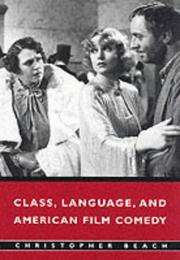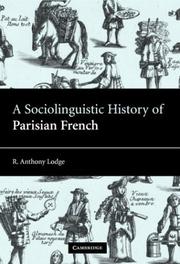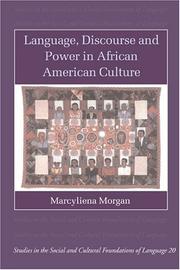| Listing 1 - 10 of 15 | << page >> |
Sort by
|
Book
ISBN: 9781781256107 1781256101 Year: 2019 Publisher: London: Profile books,
Abstract | Keywords | Export | Availability | Bookmark
 Loading...
Loading...Choose an application
- Reference Manager
- EndNote
- RefWorks (Direct export to RefWorks)
It's not what you say, it's the way that you say it ...There have long been debates about 'correct' pronunciation in the English language, and Britain's most distinguished linguistic expert, David Crystal, is here to set the record straight. Sounds Appealing tells us exactly why, and how, we pronounce words as we do.Pronunciation is integral to communication, and is tailored to meet the demands of the two main forces behind language: intelligibility and identity. Equipping his readers with knowledge of phonetics, linguistics and physiology - with examples ranging from Eliza Doolittle to Winston Churchill - David Crystal explores the origins of regional accents, how they are influenced by class and education, and how their peculiarities have changed over time.
English language --- Speech and social status. --- Pronunciation. --- History.
Book
Year: 1956 Publisher: London : H. Hamilton,
Abstract | Keywords | Export | Availability | Bookmark
 Loading...
Loading...Choose an application
- Reference Manager
- EndNote
- RefWorks (Direct export to RefWorks)
Aristocratie --- Speech and social status --- English language --- Nobility --- Langage.
Book
ISBN: 1315858134 Year: 2023 Publisher: Taylor & Francis (Unlimited)
Abstract | Keywords | Export | Availability | Bookmark
 Loading...
Loading...Choose an application
- Reference Manager
- EndNote
- RefWorks (Direct export to RefWorks)
"Orelus' valuable study draws on the scholarly work of sociocultural and postcolonial theorists, as well as testimonies collected from study participants, to explore accentism, the systemic form of discrimination against speakers whose accents deviate from a socially constructed norm. Orelus examines the manner in which accents are acquired and the effects of such acquisition on the learning and educational experiences of linguistically and culturally diverse students. He goes on to demonstrate the ways and the degree to which factors such as race, class, and country of origin are connected with nonstandard accent-based discrimination. Finally, this book proposes alternative ways to challenge and counter the accentism that minority groups, including linguistically and culturally diverse groups, have faced in schools and in society at large. It will be of interest to all of those concerned with linguistic/accent-based prejudice and the experience of those who face it"--
Book
ISBN: 9782359351064 2359351060 Year: 2014 Publisher: Limoges: Lambert-Lucas,
Abstract | Keywords | Export | Availability | Bookmark
 Loading...
Loading...Choose an application
- Reference Manager
- EndNote
- RefWorks (Direct export to RefWorks)
Interroger les rapports entre langues, locuteurs et notions de pouvoir, non-pouvoir et contre-pouvoir est ambitieux. Ces rapports sont multiples et ces notions sont complexes. La collaboration entre le RFS – Réseau Francophone de Sociolinguistique –, l’UMR CNRS 6240 LISA et l’université de Corse, a permis de revenir sur ces thématiques. L’ouvrage s’articule en cinq parties pour autant de transversalités :1. Le sociolinguiste et le pouvoir politique, juridique et social2. Approche conceptuelle, théorique et critique du pouvoir langagier3. Enjeux de pouvoir du plurilinguisme4. La minoration et le pouvoir en questions5. Le pouvoir d’agirLeur objectif commun est d’explorer la manière dont, dans des espaces sociaux diversifiés, le langage en tant que pratiques, discours et idéologie, constitue un instrument de pouvoirs, de non-pouvoirs et de contre-pouvoirs. Les auteurs cherchent avant tout à comprendre les processus sociaux qui font du langage un terrain de lutte, de consensus ou de construction de la différence
Sociolinguistique --- Politique linguistique --- Diglossie --- Multilinguisme --- Sociolinguistics --- Power (Social sciences) --- Speech and social status --- Language and languages --- Political aspects --- Sociolinguistique. --- Politique linguistique. --- Diglossie. --- Multilinguisme. --- Language and languages - Political aspects
Book
ISBN: 1108649203 1108650767 1108680704 1108491898 1108741290 Year: 2019 Publisher: Cambridge : Cambridge University Press,
Abstract | Keywords | Export | Availability | Bookmark
 Loading...
Loading...Choose an application
- Reference Manager
- EndNote
- RefWorks (Direct export to RefWorks)
How are peoples' ideas about languages, ways of speaking and expressive styles shaped by their social positions and values? How is difference, in language and in social life, made - and unmade? How and why are some differences persuasive as the basis for action, while other differences are ignored or erased? Written by two recognised authorities on language and culture, this book argues that ideological work of all kinds is fundamentally communicative, and that social positions, projects and historical moments influence, and are influenced by, people's ideas about communicative practices. Neither true nor false, ideologies are positioned and partial visions of the world, relying on comparison and perspective; they exploit differences in expressive features - linguistic and otherwise - to construct convincing stereotypes of people, spaces and activities. Using detailed ethnographic, historical and contemporary examples, this outstanding book shows readers how to analyse ideological work semiotically.
Language and culture. --- Speech and social status. --- Language and languages --- Characterology of speech --- Language diversity --- Language subsystems --- Language variation --- Linguistic diversity --- Variation in language --- Social classes and language --- Social classes and speech --- Social status and language --- Social status and speech --- Speech and social classes --- Social status --- Culture and language --- Culture --- Variation. --- Language and culture --- German language --- Semiotics --- Sociolinguistics. --- Speech and social status --- History --- Variation

ISBN: 2852970627 9782852970625 Year: 1979 Volume: 8 Publisher: Paris: Société d'études linguistiques et anthropologiques de France,
Abstract | Keywords | Export | Availability | Bookmark
 Loading...
Loading...Choose an application
- Reference Manager
- EndNote
- RefWorks (Direct export to RefWorks)
French language --- Phonetics --- Sociolinguistics --- Speech and social status --- Social classes --- Pronunciation --- Social aspects --- Phonetic transcriptions --- -French language --- -Speech and social status --- -Social classes --- -Langue d'oïl --- Romance languages --- Class distinction --- Classes, Social --- Rank --- Caste --- Estates (Social orders) --- Social status --- Class consciousness --- Classism --- Social stratification --- Social classes and language --- Social classes and speech --- Social status and language --- Social status and speech --- Speech and social classes --- -Phonetic transcriptions --- -Pronunciation --- Langue d'oïl --- French language - France - Paris - Pronunciation --- French language - Social aspects - France - Paris --- Speech and social status - France - Paris --- Social classes - France - Paris --- French language - Phonetic transcriptions --- LINGUISTIQUE --- PHONOLOGIE, PHONETIQUE ET PRONONCIATION --- FRANCAIS (LANGUE) --- PRONONCIATION --- PARIS

ISBN: 9780511606342 9780521807494 9780521002097 0511020422 9780511020421 0511029187 9780511029189 0521807492 0511606346 9780511044472 051104447X 0511157878 9780511157875 0521002095 9786610419319 6610419310 1107124565 9781107124561 0511323603 9780511323607 1280419318 9781280419317 0511176996 9780511176999 Year: 2002 Publisher: Cambridge, UK ; New York : Cambridge University Press,
Abstract | Keywords | Export | Availability | Bookmark
 Loading...
Loading...Choose an application
- Reference Manager
- EndNote
- RefWorks (Direct export to RefWorks)
This book examines the evolution of American film comedy through the lens of language and the portrayal of social class. Christopher Beach argues that class has been an important element in the development of sound comedy as a cinematic form. With the advent of sound in the late 1920s and early 1930s, filmmakers recognized that sound and narrative enlarged the semiotic and ideological potential of film. Analyzing the use of language in the films of the Marx Brothers, Frank Capra, Woody Allen and the Coen brothers, among others, Class, Language, and American Film Comedy traces the history of Hollywood from the 1930s to the present, while offering a new approach to the study of class and social relationships through linguistic analysis.
Book
ISBN: 1108851126 1316443094 1108850782 1107131219 Year: 2020 Publisher: Cambridge : Cambridge University Press,
Abstract | Keywords | Export | Availability | Bookmark
 Loading...
Loading...Choose an application
- Reference Manager
- EndNote
- RefWorks (Direct export to RefWorks)
The Tudors are one of the best known royal families in English history. Over three generations, they constructed and maintained their status and authority during a period of social, political and religious unrest. This book examines the textual basis of Tudor royal power. Through analyses of correspondence alongside genres including proclamations and historical chronicles, the book explores the visual and verbal practices that came to symbolise monarchic authority in the Tudor era. Mel Evans combines concepts from sociolinguistics and pragmatics with corpus linguistic methods to explore the characteristics of authentic English language Tudor texts, alongside materials reporting and appropriating royal language. The book reveals a pervasive sixteenth-century royal voice - one which is central to the articulation and perpetuation of Tudor monarchic power.
English language --- Germanic languages --- History. --- Speech and social status --- History --- Written English --- Great Britain --- Social classes and language --- Social classes and speech --- Social status and language --- Social status and speech --- Speech and social classes --- Social status

ISBN: 0521821797 0521100712 1107145732 0511185499 0511184662 0511326998 0511486685 1280457880 0511187297 0511186363 9780521821797 9780511187292 9780511186363 9780511185496 9780511184666 9780511486685 9781280457883 9786610457885 6610457883 9781107145733 9780511326998 9780521100717 Year: 2005 Publisher: Cambridge: Cambridge university press,
Abstract | Keywords | Export | Availability | Bookmark
 Loading...
Loading...Choose an application
- Reference Manager
- EndNote
- RefWorks (Direct export to RefWorks)
Paris mushroomed in the thirteenth century to become the largest city in the Western world, largely through in-migration from rural areas. The resulting dialect-mixture led to the formation of new, specifically urban modes of speech. From the time of the Renaissance social stratification became sharper as the elites distanced themselves from the Parisian 'Cockney' of the masses. Nineteenth-century urbanisation transformed the situation yet again with the arrival of huge numbers of immigrants from far-flung corners of France, levelling dialect-differences and exposing ever larger sections of the population to standardising influences. At the same time, a working-class vernacular emerged which was distinguished from the upper-class standard not only in grammar and pronunciation but most markedly in vocabulary (slang). This book examines the interlinked history of Parisian speech and the Parisian population through these various phases of in-migration, dialect-mixing and social stratification from medieval times to the present day.
804.0-087 --- French language --- -French language --- -Speech and social status --- -Social classes and language --- Social classes and speech --- Social status and language --- Social status and speech --- Speech and social classes --- Social status --- Langue d'oïl --- Romance languages --- 804.0-087 Frans: dialecten --- Frans: dialecten --- Social aspects --- -Dialects --- -Variation --- -Paris (France) --- -Social life and customs --- -804.0-087 Frans: dialecten --- Social classes and language --- Langage et statut social --- -Frans: dialecten --- Speech and social status --- Dialects --- Variation --- Paris (France) --- Social life and customs. --- Sociolinguistics --- Dialectology --- Paris --- Français (Langue) --- Aspect social --- Dialectes --- Moeurs et coutumes --- France --- Arts and Humanities --- Language & Linguistics --- French language - Social aspects - France - Paris --- French language - Dialects - France - Paris --- French language - Variation - France - Paris --- Speech and social status - France - Paris --- Paris (France) - Social life and customs

ISBN: 051161361X 0521806712 0521001498 Year: 2002 Volume: no. 20 Publisher: Cambridge : Cambridge University Press,
Abstract | Keywords | Export | Availability | Bookmark
 Loading...
Loading...Choose an application
- Reference Manager
- EndNote
- RefWorks (Direct export to RefWorks)
African American language is central to the teaching of linguistics and language in the United States, and this book, in the series Studies in the Social and Cultural Foundations of Language, is aimed specifically at upper level undergraduates and graduates. It covers the entire field - grammar, speech, and verbal genres, and it also discusses the various historical strands that need to be identified in order to understand the development of African American English. The first section deals with the social and cultural history of the American South, the second with urban and northern black popular culture, and the third with policy issues. Morgan examines the language within the context of the changing and complex African American and general American speech communities, and their culture, politics, art and institutions. She also covers the current heated political and educational debates about the status of the African American dialect.
Black English. --- English language --- Speech and social status --- Power (Social sciences) --- African Americans --- Language and culture --- Germanic languages --- Social classes and language --- Social classes and speech --- Social status and language --- Social status and speech --- Speech and social classes --- Social status --- African American English --- American black dialect --- Ebonics --- Negro-English dialects --- Social aspects --- Social conditions. --- Discourse analysis. --- Languages. --- Languages --- Social Sciences --- Anthropology --- Culture
| Listing 1 - 10 of 15 | << page >> |
Sort by
|

 Search
Search Feedback
Feedback About UniCat
About UniCat  Help
Help News
News